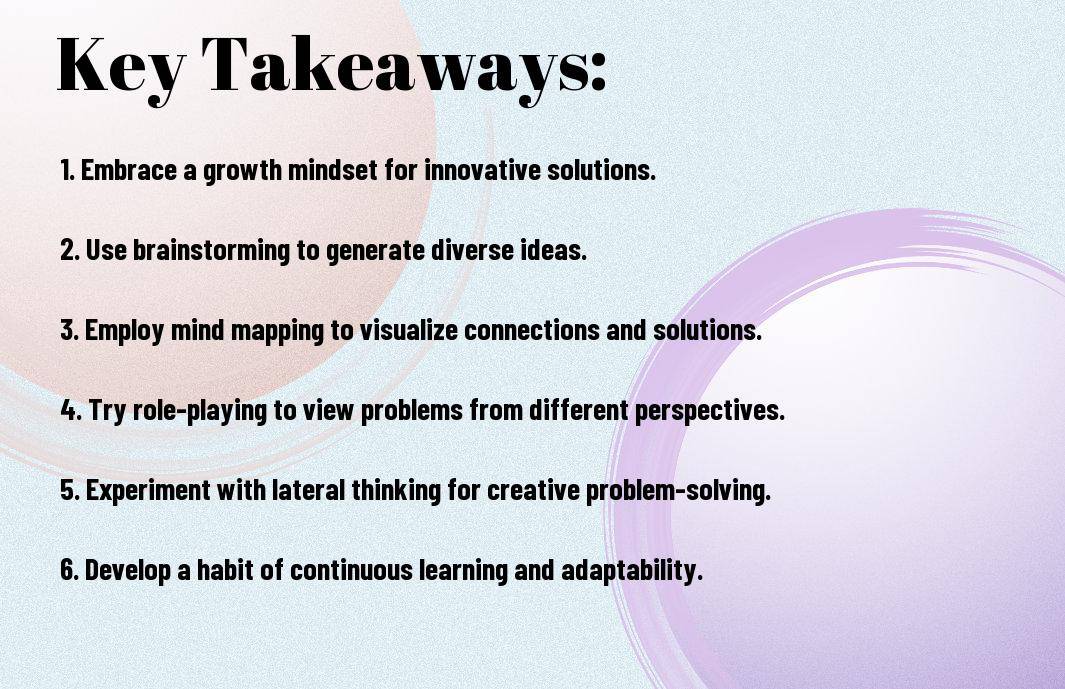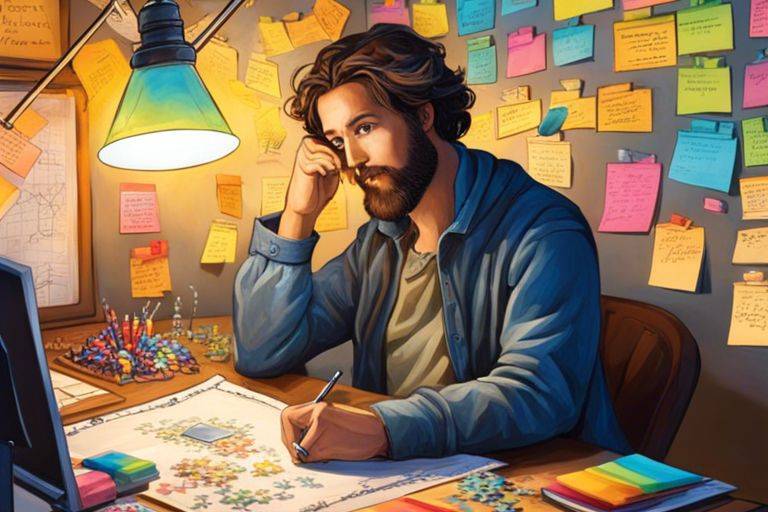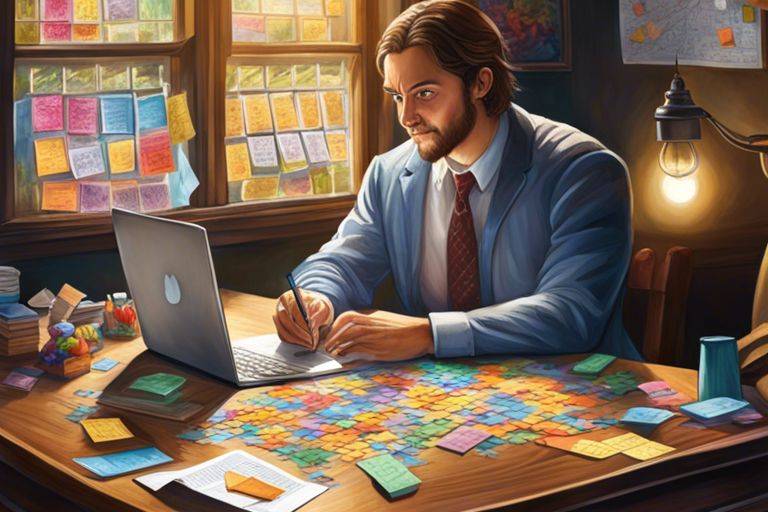Most individuals encounter obstacles and challenges in their career and personal lives that require innovative solutions. Creative problem-solving is a crucial skill that can elevate your success and satisfaction both professionally and personally. By mastering various techniques to tackle problems creatively, you can unlock new opportunities and overcome limitations that may be holding you back.

Key Takeaways:
- Embrace a growth mindset: Approach challenges with a positive attitude and view them as opportunities for growth and learning.
- Think outside the box: Encourage creativity by exploring unconventional solutions and looking at problems from different perspectives.
- Brainstorm effectively: Utilize group brainstorming sessions to generate a wide range of ideas and solutions to a problem.
- Use mind mapping techniques: Visualize connections between ideas and concepts to organize thoughts and spark new creative solutions.
- Apply the SCAMPER technique: Use this method to generate new ideas by asking questions related to Substitute, Combine, Adapt, Modify, Put to another use, Eliminate, and Reverse.
- Practice active listening: Enhance communication and problem-solving skills by actively listening to others’ perspectives and ideas.
- Persevere and iterate: Be persistent in solving problems, and be willing to iterate and refine solutions based on feedback and new information.

The Psychology of Creativity
While creativity is often seen as a mysterious and innate talent, the truth is that it is a skill that can be developed and honed over time. Understanding the psychology of creativity can provide valuable insights into how to tap into your creative potential and enhance both your career and personal life.
Understanding the Creative Mindset
Creativity is not just about coming up with new ideas; it is about approaching problems and challenges with an open mind and a willingness to explore unconventional solutions. The creative mindset is characterized by curiosity, flexibility, and a willingness to take risks. By cultivating these traits, you can expand your thinking and unleash your creativity in new and exciting ways.
Overcoming Mental Blocks to Creativity
Understanding the common mental blocks that can inhibit creativity is vital for unlocking your full creative potential. These blocks can take many forms, such as self-doubt, fear of failure, or the pressure to conform to norms. By recognizing and addressing these barriers, you can break free from limiting beliefs and unleash your creativity. By adopting a growth mindset and embracing failure as a natural part of the creative process, you can overcome mental blocks and unlock your true creative potential.

Strategies for Enhancing Creativity
Building a Creative Environment
Unlike traditional workspaces, a creative environment nurtures the free flow of ideas and encourages innovative thinking. To enhance creativity, it is important to design a space that fosters inspiration and imagination. Consider incorporating elements like colorful decorations, comfortable furniture, natural lighting, and plants to create a stimulating atmosphere. Allowing flexibility in work schedules and encouraging collaboration can also contribute to a more creative workplace.
Mindfulness and Creativity
On the other hand, mindfulness plays a crucial role in enhancing creativity. By focusing on the present moment and being fully aware of thoughts and feelings, individuals can tap into their inner creativity. Practicing mindfulness techniques such as meditation and deep breathing can help reduce stress and increase mental clarity, allowing for more original and inventive ideas to emerge.
To further promote mindfulness and creativity, individuals can benefit from setting aside dedicated time each day for reflection and introspection. This practice can lead to improved concentration and a deeper connection with one’s creative intuition.
Creative Problem Solving Techniques
All successful professionals encounter problems that require creative solutions. With the right techniques, you can enhance your problem-solving skills and excel in your career and personal life. Let’s explore some powerful methods to tackle challenges and stimulate innovative thinking.
Brainstorming and its Variations
On the quest for fresh ideas and solutions, brainstorming remains a classic technique. Simply gather a group of diverse thinkers and encourage them to freely share ideas. Brainstorming allows for a range of perspectives and can lead to breakthrough innovations. To enhance this method, consider variations like reverse brainstorming, where participants identify ways to cause the problem, or brainwriting, where individuals write down ideas anonymously before sharing them aloud.
The SCAMPER Technique
To inject creativity into problem-solving, consider using the SCAMPER technique. This method prompts you to Substitute, Combine, Adapt, Modify, Put to other uses, Eliminate, or Reverse aspects of a problem to generate innovative solutions. By systematically applying these actions to a challenge, you can uncover unique perspectives and uncover unexpected opportunities.
Technique – The SCAMPER Technique is versatile and can be used in various fields, from product development to marketing strategy. It challenges individuals to think outside the box and explore unconventional approaches to problem-solving. By leveraging SCAMPER, you can unlock your creative potential and devise inventive solutions that set you apart.
Mind Mapping for Complex Problems
Technique – When facing complex issues, Mind Mapping can be a powerful tool to organize thoughts and visualize connections. Start with a central concept or problem in the middle of a page and branch out with related ideas. Mind Mapping allows you to see the bigger picture, identify key relationships, and uncover hidden patterns that can lead to effective solutions.
The Six Thinking Hats Method
When dealing with thorny problems, consider employing the Six Thinking Hats method. This technique, developed by Edward de Bono, assigns different “hats” to participants, each representing a unique thinking style – analytical, optimistic, cautious, creative, and so on. By wearing these metaphorical hats, individuals can explore problems from multiple angles and make more informed decisions.
Variations
Techniques – The Six Thinking Hats method can be adapted to suit various scenarios, whether in team meetings, strategic planning sessions, or personal decision-making processes. By utilizing different thinking styles, teams can foster constructive discussions, reduce conflicts, and ultimately arrive at more effective solutions. Embrace the diversity of perspectives and enhance your problem-solving capabilities with this versatile method.
The Creative Process in Action
Recognizing the Stages of Creative Problem Solving
Not all creative processes are the same, but there are common stages that individuals typically experience when engaging in creative problem-solving. The first stage involves recognizing that there is a problem or challenge that needs to be addressed. This initial awareness is vital as it sets the stage for the rest of the creative process.
Techniques for Each Stage of the Process
Action is vital to move through the stages of creative problem-solving effectively. Techniques for each stage can help individuals navigate the process more efficiently. For example, in the ideation stage, where the focus is on generating ideas, techniques such as brainstorming, mind mapping, or reverse thinking can be utilized to encourage divergent thinking and exploration of different solutions.
For instance, in the evaluation stage, techniques like SWOT analysis, PMI (Plus, Minus, Interesting), or decision matrices can be employed to weigh the pros and cons of each idea and determine the most viable solution. By utilizing these techniques at each stage of the creative process, individuals can enhance their problem-solving skills and increase their chances of coming up with innovative solutions.
Implementing Creative Solutions
Now, to become a more effective problem-solver, it is vital to implement creative solutions that can lead to positive outcomes in both your career and personal life. For practical insights on how to enhance your creativity and problem-solving skills, check out How to Be a More Creative Problem-Solver at Work: 8 Tips.
Criteria for Evaluating Creative Ideas
Creative problem solving involves evaluating ideas to determine which ones are most feasible and effective. When assessing creative ideas, it is important to consider originality, practicality, impact, and alignment with goals. This comprehensive evaluation process helps in selecting the most promising solutions that can address the underlying issues effectively.
Transforming Ideas into Actionable Plans
Creative problem solving goes beyond generating ideas; it also involves transforming these ideas into actionable plans. This process requires defining clear objectives, outlining specific steps, establishing timelines, and allocating resources to ensure successful implementation. Without a well-defined action plan, even the most innovative ideas may remain unrealized.
For instance, creating a detailed project timeline can help in tracking progress and identifying potential bottlenecks in the implementation process. It is crucial to assign responsibilities to team members and establish accountability measures to ensure that the action plan is executed efficiently. By monitoring and adjusting the plan as needed, individuals and teams can stay on course towards achieving their goals.
Fostering Creativity in Teams
Your team’s ability to think creatively and solve problems effectively can make a significant impact on your career and personal life. If you want to enhance your creative problem-solving skills, check out How to improve your creativity and problem-solving skills for some great insights.
Encouraging Diverse Perspectives
Creativity thrives on diversity. Encouraging team members to share their unique perspectives and experiences can lead to innovative solutions. Embrace different viewpoints, backgrounds, and skills within your team to foster a culture of creativity and inclusion. By valuing diverse perspectives, you can spark new ideas and approaches to problem-solving that may not have been considered otherwise.
Tools for Collaborative Innovation
Collaborative tools are vital for promoting teamwork and creative problem-solving within a group. Utilize technologies like project management software, online brainstorming platforms, and virtual collaboration tools to enhance communication and idea generation. These tools enable team members to work together efficiently, regardless of location, and facilitate the exchange of ideas in real-time.
Innovation is key to staying ahead in today’s fast-paced world. By equipping your team with the right tools and fostering a collaborative environment, you can encourage innovative thinking and drive impactful solutions. Harness the power of collaboration and technology to unlock your team’s creative potential and achieve success in both your career and personal endeavors.

Cultivating Personal Creativity
To unlock your full creative potential, it is important to cultivate personal creativity. This chapter will examine into various techniques and practices that can enhance your creative abilities in both your career and personal life.
Daily Habits to Boost Creativity
Creativity is a muscle that needs to be exercised daily to stay sharp and innovative. Some daily habits that can help boost your creativity include setting aside time for brainstorming, practicing mindfulness and meditation, seeking inspiration from diverse sources such as books, art, or nature, and engaging in physical activities to stimulate your mind.
Overcoming Personal Barriers to Creative Thinking
Creative thinking can often be hindered by personal barriers such as fear of failure, self-doubt, and perfectionism. It is crucial to overcome these barriers to allow your creative ideas to flow freely. By embracing failure as a learning opportunity, building self-confidence through small creative wins, and letting go of the need for perfection, you can unleash your full creative potential.
Personal barriers to creative thinking can hold you back from exploring new ideas and solutions. By addressing and overcoming these barriers, you can open up new possibilities and innovate in both your personal and professional life.
Final Words
Considering all points discussed, creative problem-solving techniques are vital skills that can greatly enhance your career and personal life. By utilizing techniques such as brainstorming, mind mapping, and lateral thinking, you can approach challenges with a fresh perspective and generate innovative solutions. These skills are highly valued in the workplace and can set you apart as a proactive and resourceful problem-solver.
Furthermore, applying creative problem-solving techniques can lead to increased confidence, improved communication, and a more positive mindset. As you continue to practice and refine these skills, you will become more adept at overcoming obstacles and achieving your goals, both professionally and personally. Invest in developing your creative problem-solving abilities, and watch as new opportunities and successes unfold in your life.
FAQ
Q: What is Creative Problem Solving (CPS)?
A: Creative Problem Solving (CPS) is a structured approach to generating and implementing innovative solutions to challenges and opportunities.
Q: Why is Creative Problem Solving important?
A: Creative Problem Solving is important because it enables individuals to think outside the box, adapt to change, and find unique solutions that drive success in both personal and professional endeavors.
Q: What are some key benefits of using Creative Problem Solving techniques?
A: Some key benefits of using Creative Problem Solving techniques include improved decision-making skills, increased innovation, enhanced collaboration, and a greater sense of empowerment and self-confidence.
Q: What are some popular Creative Problem Solving techniques?
A: Some popular Creative Problem Solving techniques include brainstorming, mind mapping, lateral thinking, the SCAMPER method, and the Six Thinking Hats approach.
Q: How can Creative Problem Solving enhance your career?
A: Creative Problem Solving can enhance your career by helping you stand out as a valuable and innovative employee, leading to increased opportunities for career advancement and professional growth.
Q: How can Creative Problem Solving improve your personal life?
A: Creative Problem Solving can improve your personal life by helping you overcome obstacles, make better decisions, foster creativity in various aspects of your life, and enhance your overall problem-solving skills.
Q: Can anyone learn and benefit from Creative Problem Solving techniques?
A: Yes, anyone can learn and benefit from Creative Problem Solving techniques. These skills can be cultivated and honed through practice and dedication, leading to positive outcomes in both personal and professional pursuits.


